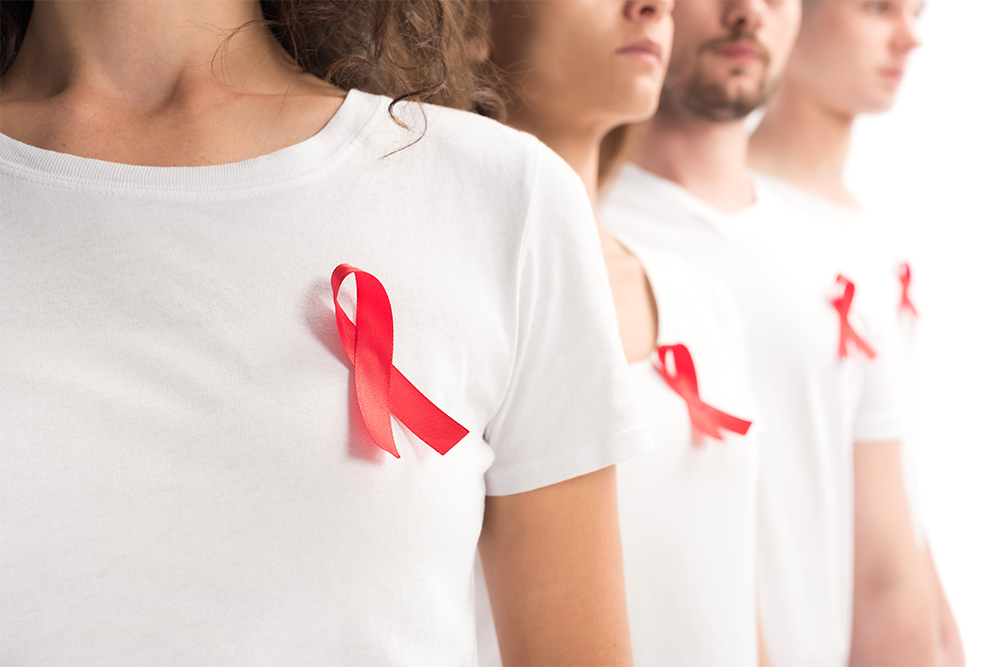
The human immunodeficiency virus (HIV) doesn’t discriminate. The virus affects the young, the old, and people of all races, cultures, genders or gender identities. Throughout the year, HIV/AIDs awareness days promote education, prevention and compassion to those diagnosed with the virus. You can be a part of the effort to raise awareness while decreasing stigmatization.
HIV and AIDS
AIDS (acquired immunodeficiency syndrome) is the advanced state of HIV, but all people who develop HIV do not advance to an AIDS diagnosis. Proper medical care and a healthy lifestyle enables people to live many happy and productive years with HIV.
HIV weakens the immune system by killing specific cells that combat disease and infection. Scientists haven’t discovered a cure for the disease, but medications and care can control or maintain the condition from becoming AIDS.
AIDS occurs when:
- CD4 cells — a lymphocyte that helps coordinate the body’s immune response — decrease to under 200 cells per cubic meter of blood
- An individual acquires any infections that take advantage of their compromised immune system
People who develop AIDS and do not receive proper medical care generally live about three years. However, those who do receive care and adhere to their medication regimen can live much longer.
Causes of HIV
As said before, anyone can get HIV. According to the Mayo Clinic, some people have contracted it through routine blood transfusion, or babies can get it from infected mothers during pregnancy, delivery or through breast-feeding. Risky behaviors, though, increase the risk of HIV.
Alcohol and Drugs
Sharing needles, syringes or cookers with a person with HIV increases the risk of catching the virus. HIV can live up to 42 days on a used needle or other injection tools.
Sex
The risk of contracting HIV is high when a person regularly uses alcohol or drugs and has unprotected sex. The influence of the substance lowers a person’s inhibitions, allowing a person to take more significant risks or risks they wouldn’t take if they were sober. Risky sex includes:
- Unprotected anal or vaginal sex
- Multiple sex partners
Symptoms of HIV
People can have HIV and not have symptoms. The best way to know if one has HIV is to have regular testing.
Stage I: Subtle Signs of HIV Infection
A few of these flu-like symptoms can occur two to four weeks after being infected with the disease.
- Fever
- Chills
- Muscle pain
- Ulcers in the mouth
- Fatigue
- Sweating during the night
These symptoms can be for a few days or several weeks. However, a person can also have stage I HIV and not experience any symptoms.
Stage II: Chronic Infection
Whether or not a person has stage I symptoms, the virus can progress into a chronic infection. The chronic infection stage, like stage I, can also go undetected. A person can live a decade or more even if they aren’t receiving medical care; a caveat, they can also live fewer years if the disease progresses quickly.
Stage III: AIDS
Perhaps a person doesn’t have any of the symptoms of HIV and their disease goes undetected eventually, the immune system will weaken and can develop into AIDS. Some signs of AIDS are:
- Rapid weight loss
- Consistent fever or sweating at night
- Unexplained or severe fatigue
- Long-term swelling of the lymph nodes
- Pneumonia
Preventing HIV
Individuals can decrease their risk of HIV if they take the following precautions:
- Engage in safe sex practices, such as always using a condom.
- Decrease sexual partners — a smaller number of sex partners decreases the chances of having sex with an infected person.
Doctor-recommended Pre-exposure Prophylaxis (PrEP),when taken daily, can cut back the risk of contracting HIV.
- Begin mental health or substance addiction therapy.
After an HIV Diagnosis
A diagnosis of HIV can leave someone stunned, depressed, scared or anxious. And if the diagnosis was because of risky behavior that relates to a substance use disorder or mental health disorder, they may want to consider getting help. It may be the ideal time to enter treatment for mental health disorders or alcohol or drug addiction and garner the coping skills necessary to get through treatment for HIV.
HIV awareness is essential, especially for those who engage in high-risk behaviors like unprotected sex, multiple sex partners, or alcohol or drug use. You can take steps to prevent infection and stop the risky behavior associated with disease transmission. Casa Palmera helps guide you through substance addiction treatment. We encourage you to discuss your mental health issues with your therapist so you can understand why substance addiction co-occurs with mental health disorders. After you form a treatment plan, we strengthen your belief in yourself and your health journey. Receiving care for alcohol, substance addiction or mental health is the beginning of understanding how to recognize triggers and use healthy coping skills. To schedule an appointment, call (855) 508-0473.




